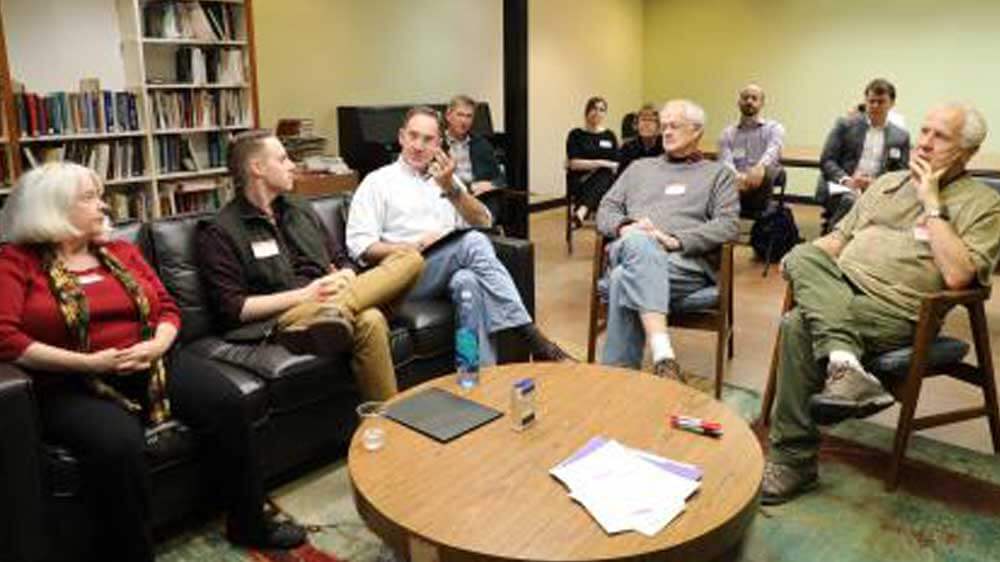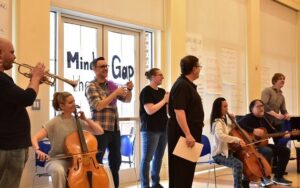According to a recent survey, 80% of Americans are convinced that their country is deeply divided politically. In the run-up to the mid-term elections, franceinfo attended a workshop aimed at reconciling progressives and conservatives.
If you want to convince the other side, you are mistaken. Here, what we are looking for between you, these are common points.
Reena
one of the two leaders
Sitting around the table, a “blue” between each “red”, the day starts with the presentations. Who are these men and women, and why did they choose to come to this workshop? Diana, an analyst in Arlington, is a Democrat, and would like to learn to talk to Republicans. Monte, a professor of history and social sciences at a high school in Alexandria, Virginia, is Republican and has felt the need to “get involved” in these exchanges. Phyllis and JC, two “blue” pensioners, therefore Democrats, see their country split in two, and worry. “I have relatives who are ‘red’, and it’s war with them,” laments JC, behind an imposing white beard.
These volunteers are among the more than 3,000 Americans who, on both sides of the United States, have already taken part in these atypical days. In just two years, Braver Angels has organized nearly 250 workshops from Texas to Minnesota through California. The idea of Better Angels was born after the presidential election on November 8, 2016. Two friends, David Blankenhorn and David Lapp, are called that day. One is in New York, and describes a “depressing” mood after Donald Trump’s victory. The other is in South Lebanon, Ohio, and observes a festive atmosphere after the defeat of Hillary Clinton. Witnesses of such a contrast, they wonder. “Why not bring together Democrats and Republicans?”
We rarely talk about politics with people with different opinions. Our goal is to ensure that these Americans see each other as human beings first and foremost, not as political enemies.
Donna Murphychief
organizer of Better Angels
Engaged in the project since May 2017, the progressive Donna Murphy concedes that, from now on, she “likes” the “reds”. “They have become friends ,” she says with a smile, ” I still disagree with them, but I see their humanity, before they were just adversaries.”
Deconstruct (and recognize) critics
In Arlington Church, it is time for the first conciliation exercise. The two clans move to separate rooms, followed by silent observers. Each group, isolated from the other, must write in black and white a list of stereotypes reproached to their political edge. And distinguish the true from the false in these prejudices. “We’re mean, stupid, angry and crazy, right?” Bruce, a 74-year-old conservative pensioner, comfortably seated among other Republicans. His neighbors let out a laugh. “Without compassion,” says Bryan, a 33-year-old consultant. “Homophobic, misogynist,”adds Teri.
The group stops by the idea that the Conservatives are racist. “It’s not true,” react two participants. “But is not there a foundation of truth?” causes the host Jane. “In immigration, it is true that some ‘red’ focus on Hispanics,” admits Bryan, accepting this criticism of the left. “And white nationalists often identify as ‘red’,” assumes another young conservative.
In the other room, the “blues” look at several shots. In particular on the one, conveyed by the right, according to which the Democrats “are against the family values” . Several volunteers defend themselves. “Including non-Christian people, or being pro-choice [for the right to abortion] does not question our commitment to family values,” says one of the participants. Reena, like her colleague, pushes them to their limits. “Recognizing a diversity of genres can be difficult, confusing for some,” Tony agrees.
After the introspection, place to self-criticism. Together, “blue” and “red” must confide in what is good on their side and what is not right for them. Republican Bryan regrets the lack of reflection on the climate among supporters of the Grand Old Party. On the side of “blues”, Diana concedes that the Democrats carry only one message, “anti-trumpism”. “We should be more interested in the demands of his constituents,” says Allen. At each concession, the audience applauds.
Possible common ground
Thanks to the workshop, “I learned for example that for the ‘reds’, the concept of solidarity in their community, in their neighborhood, is also important, I work a lot, and I will be less afraid to do it with them, ” says Diana. “Amen, my sister,” Teri, her conservative neighbor, reacts. The two women, opposed on the political chessboard, exchange a “high five” accomplice.
The time for debate has now come. For an hour, each side asks the questions they want on the other side. But “attention, do not ask a ‘red’ how he could vote for Donald Trump or a ‘blue’ how he could support Hillary Clinton warns, tone laughing, Reena, host. Ask questions curious. ” Deena responds to Republicans blaming the Democrats for a lack of tolerance of conservative views. “I totally agree with that,” she asserts, citing freedom of expression.
The day is coming to an end. The 14 participants, still surrounded by observers, meet in the hall of the church to take stock of the workshop. “Well, we found things in common,” says Monte. “Their answers were more reasonable than I expected!” smiles the “blue” JC. Around the table, Deena and Allen promise to talk to more Republicans. The latter nevertheless has a doubt: “Are we really representative of the national debate?” if he asks. “I’m not sure there are really any ‘reds’ here ,” says the “blue.” I think there are rather “nice reds.”
The organization Better Angels now wants to tackle this challenge. “The next step will be the rural areas,” reputedly more conservative and closer to Trump, said Donna Murphy. Can an early Trumpist ever get along with a deep democrat? A Better Angels, we’re convinced – it’s already happened.




